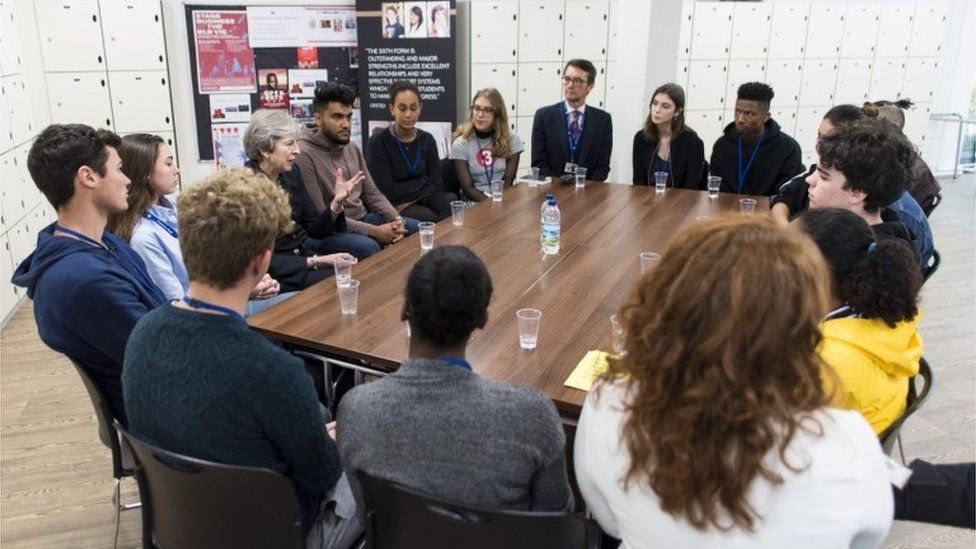UK must act against race inequality, Theresa May says
- Published

Theresa May has warned public services there will be "nowhere to hide" if they treat people differently on the basis of their race.
A new government website shows disparities in educational attainment, health, employment and treatment by police and courts between ethnicities.
The PM said institutions must "explain or change" any variations - but critics are demanding action from ministers.
Labour says government must accept its role in exacerbating injustice.
The figures cover a wide range of lifestyle indicators, including:
- Black Caribbean pupils are permanently excluded from school three times as often as white British classmates
- White British pupils on free school meals perform the worst at key stage two, with just 32% reaching the expected level
- Indian, Pakistani and white people are more likely to own their own homes than black and Bangladeshi individuals
- Unemployment among black, Asian and minority ethnic people is nearly double that of white Britons
- Rates of smoking are highest in the mixed and white ethnic groups
- Just over half of white adults ate five portions of fruit and vegetables a day, compared with a third of black adults
"People who have lived with discrimination don't need a government audit to make them aware of the scale of the challenge," Mrs May said.
"This audit means that for society as a whole - for government, for our public services - there is nowhere to hide."
Among those contacting the BBC, Shaneil, from Moss Side, Manchester, said: "It shouldn't matter where you come from or your race. You should be equal, you should be able to do anything you want to do.
"We need more different ethnicities to be in power as well."
Joseph G Jones, of the Gypsy Council, said the government was failing its Romani and Traveller communities with "multi-discrimination" across people's lifetimes.
"The younger generations shouldn't have to put up with endemic ongoing discrimination - for the time being there is little light at the end of the tunnel," he said.
And Victoria Stevens, a Ukrainian who has lived in the UK for 18 years told the BBC she had no problem in applying for jobs, as she had a mechanical engineering degree, plenty of work experience, and her late husband's English surname.
But she added: "However, when it came to career progression, I found that a British candidate would get a promotion above me, every time."
Awal Hassan tells Radio 4's Today he was unable to take out a loan for a council flat
Almost all the data released on 'Ethnicity Facts and Figures' is already publicly available and no new data was commissioned for the audit.
Analysis: By BBC home editor Mark Easton
This audit is a giant nudge to change behaviour on issues of race inequality. The odd thing is that the project is not a government trying to nudge the people. It is a government trying to nudge itself.
The prime minister has dedicated her premiership to fighting burning injustices and says she is determined to shine a light on disparities between different racial groups in the UK on a range of areas - health, education, job prospects, housing and so on.
A focus on the many and often troubling differences is - of course - no bad thing, but people might well wonder why we need a public website to get Whitehall departments to take an interest.
And given that ministers have known about these "troubling" and "shocking" disparities for years or even decades, why does it take a prime ministerial nudge to get them to take action?
Critics from ethnic minority backgrounds, including former deputy London mayor Munira Mirza, in a letter to The Times, said the "crude and tendentious" approach of comparing the data in the website risked "promoting a grievance culture and policies that harm the communities they aspire to help".
They said prejudice had declined "markedly" and while injustice must be challenged, there were often many underlying factors to explain differences.
Communities Secretary Sajid Javid denied it would drive a grievance culture but would help identify disparities.
"There are hundreds of thousands of British Pakistani women and Bangladeshi women who don't speak proper English, who don't speak English at all," he told BBC Radio 4's Today programme.
"That might be through choice in some cases, it might be a cultural issue. But that is a big issue because that does then hold those women back from the employment market and other opportunities."
May 'exacerbated problems'
Labour's Dawn Butler said government cuts to services had disproportionately affected women, ethnic minorities, disabled and older people.
Speaking in the House of Commons, she said the PM had "done nothing but exacerbate the problems".
"Far from tackling the burning injustices she's added fuel to the fire. We need solutions and a sustained effort to really tackle burning injustices, talking shop's just not going to cut it."
Although the audit does not focus on government policies, Mrs May is launching a number of measures to combat the differences discovered.
They include Department for Work and Pensions "hotspots" to help people from ethnic minorities get jobs, and traineeships for 16-24 year-olds.
Under the plans, the Ministry of Justice will also adopt recommendations from the Lammy Review, including demanding that prisons have performance indicators to assess how inmates are treated and how representative their workforce is.
David Lammy MP told BBC News the data was "not all doom and gloom" and "some progress" had been made.
"The truth is you can't rest back on your laurels, you can't leave race and issues of class and poverty off the agenda. Some of this has been left off the agenda over the last seven years so we've fallen backwards."
- Published27 August 2016
- Published3 October 2017
- Published7 October 2017